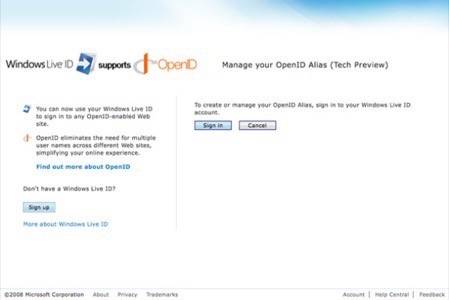OpenID – the “free and easy way to use a single digital identity across the Internet” – has rapidly gained traction as a login credential for Web 2.0 apps and sites. Its adoption by more mainstream technology properties, however, has occurred at a slower rate.

But all of that could be changing with today’s announcement from Microsoft. Anointing OpenID “the de facto standard Web protocol for user authentication,” Microsoft has moved to give millions of Windows Live users access to any OpenID-enabled site on the Web by ensuring every Windows Live ID will become an OpenID.
According to Microsoft:
“We look forward to making it easier for our users to access the Web sites they use, by reducing their need to create additional identity accounts. That is the promise of OpenID. We are happy to support that goal by providing OpenID-based sign-in functionality to Windows Live ID account holders.”

Clearly, this is huge vote of confidence for OpenID.
“It’s a big deal for OpenID because we’re seeing Microsoft ship code,” said Scott Kveton, chair of the OpenID Foundation. “This is Microsoft putting their money where their mouth is. And it’s due in no small part to Mike Jones, who has been working diligently to promote OpenID within Microsoft. I’m enormously excited to see this happening.”
Test Driving the OpenID Functionality
The Windows Live implementation is still in testing. Those interested in participating can visit https://signup.live-int.com/ to set up a Windows Live ID test account and then visit https://login.live-int.com/beta/ManageOpenID.srf to set up an OpenID test alias.
Once these steps are complete, users can begin testing the Windows Live ID on any site that supports OpenID 2.0, developers can test libraries against the Windows Live ID OP endpoint, and site owners can test the Windows Live ID OpenID alias.
Tipping Point for OpenID?
While a number of the major players – AOL, Google, and Yahoo! to name a few – have continued to verbally support the efficacy of OpenID, implementation of the technology to put OpenID into practice has been less evident.
This move by a traditionally proprietary organization like Microsoft could be the signal that gives the market – both large and small players combined – the confidence to invest more time and energy into the widespread adoption of OpenID.
That is good news for OpenID proponents. And it’s equally good news for all of us who are interested in simplifying the management of our identity across the multitude of sites we use on a day-to-day basis.










